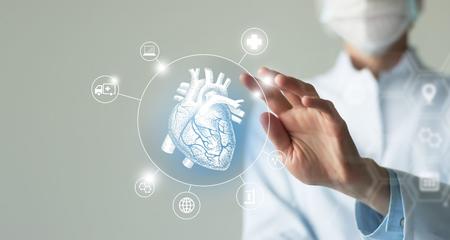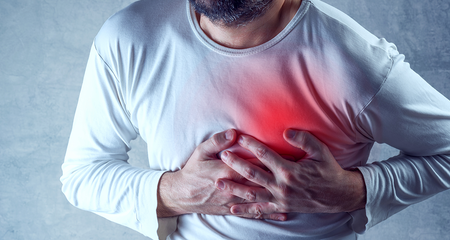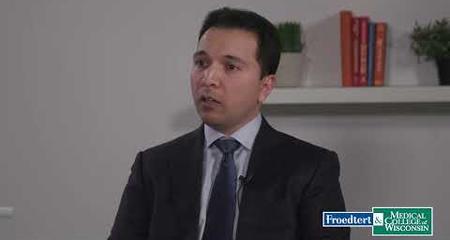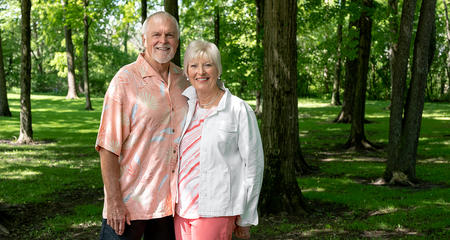Echocardiograms Reveal Extent of Damage
Echocardiograms ("echos") are ultrasound tests that use sound waves to take a moving picture of the heart. An echocardiogram can reveal the size and shape of the heart, its pumping strength, and assess the location and extent of damage to heart tissues. Additionally, an echocardiogram can evaluate the heart for valvular problems such as regurgitation (leaky valve) or stenosis (tight valve that does not open properly).
The Froedtert & the Medial College of Wisconsin Echocardiography Laboratories perform thousands of echo procedures each year. We are accredited by the Intersocietal Accreditation Commission (IAC), a national accreditation agency that requires rigorous standards for performance and interpretation of echocardiograms.
Echocardiogram tests performed in the lab include:
Transthoracic Echocardiogram (TTE)
In this common procedure, an ultrasound transducer that emits sound waves is placed on the chest in the area of the heart. The transducer picks up the echoes of sound waves and transmits them as electrical impulses to a machine that converts the impulses into images of the heart.
Transesophageal Echocardiogram (TEE)
This test is performed with sedation and involves placing a thin tube with an ultrasound probe on the end into the esophagus. The technique places the ultrasound probe closer to the heart and provides greater detail. When needed, our team can also utilize 3D transesophageal echocardiograms to diagnose heart problems.
Intracardiac Echocardiogram (ICE)
This test is conducted during procedures in the heart catheterization and electrophysiology laboratories. The test provides unique ultrasound images from inside the heart.
Echocardiogram Stress Tests (Stress Echo)
A stress echo helps determine how the heart functions under stress. The test can show if the blood supply is reduced in the arteries that supply the heart. This test can also be used to further evaluate diseases of the heart valves or abnormal pressures inside the heart or lungs. Stress tests may be done on a treadmill, a supine bicycle (the patient pedals while lying in bed), or with the use of a medication that stimulates the heart to pump faster, simulating exercise.
3D Echocardiogram
This technique provides a three-dimensional (3D) echo picture of a beating heart. The Echo Lab at Froedtert Hospital has the longest clinical experience in the state using real-time, 3D echocardiography.
Cardiac Resynchronization Therapy (CRT) Evaluation
This procedure uses echocardiography to measure the level of asynchrony (lack of synchronization) in the heart and determine a patient’s eligibility for a specialized pacemaker to correct the problem.
Strain Echocardiogram
This procedure allows physicians to identify the performance of each segment of the heart separately, which gives physicians a much more accurate indication of heart damage caused by cancer therapy or other substances.
The Society for Vascular Surgery's Vascular Quality Initiative (SVS VQI) has awarded Froedtert Hospital three out of three stars for its active participation in the Registry Participation Program. The mission of the SVS VQI is to improve patient safety and the quality of vascular care delivery by providing web-based collection, aggregation and analysis of clinical data submitted in registry format for all patients undergoing specific vascular treatments. The VQI operates 14 vascular registries.
Blogs, Patient Stories, Videos and Classes





